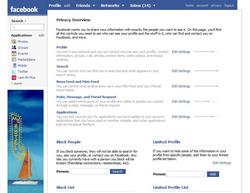Tag: Social networks
Social networks need to be more useful, so stop poking me and get a job!
After last week’s cry from those with the cash that there are too many social networks, more voices are calling for social networks to become more useful.
That follows comments from Google’s co-founder, Sergey Brin, saying that they hadn’t yet found the best way to advertise and monetise social networks, and statistics which suggest that the popularity of social networks are declining a little…
Opinion: Social networks reach the parts other sites can't reach – yes, even sexual ones!
 Jonathan Weinberg writes… According to MySpace, virtual friends are replacing real-life mates, with more people than ever using the Internet to socialise and find love. Well they would say that, wouldn’t they!
Jonathan Weinberg writes… According to MySpace, virtual friends are replacing real-life mates, with more people than ever using the Internet to socialise and find love. Well they would say that, wouldn’t they!
But interestingly, research by the social network has found they are also using the sites to “lose their virginity” with three per cent of under 24s questioned for the poll saying they’d paired up with a ‘friend’ for that purpose…
Opinion: Vodafone gives us an early Christmas pressie and unwraps Social Networking on the move
 Jonathan Weinberg writes… I saw a quick demonstration of this yesterday and it certainly looks like being a brilliant idea that I hope other mobile networks follow. With Internet prices dropping like stones across all the mobile firms thanks to bundled ‘unlimited’ data and use of social networking growing by the millions in the blink of an eye, it makes sense to match up the two.
Jonathan Weinberg writes… I saw a quick demonstration of this yesterday and it certainly looks like being a brilliant idea that I hope other mobile networks follow. With Internet prices dropping like stones across all the mobile firms thanks to bundled ‘unlimited’ data and use of social networking growing by the millions in the blink of an eye, it makes sense to match up the two.
Vodafone has designed a downloadable application that sits on your handset connecting you to Facebook, YouTube, MySpace and Bebo. Nothing majorly new there, because you can surf them at present and many have their own download applications too like the excellent Facebook program for Blackberrys…
A third of social networking users enter false information to protect their identities
 A growing trend amid all the Web 2.0 hype is concern over whether your MySpace or Facebook profile is a security risk. Certainly if you’re a smart identity thief, you could probably retire from rooting through dustbins, in favour of simply scanning social networks for people who give up too much information.
A growing trend amid all the Web 2.0 hype is concern over whether your MySpace or Facebook profile is a security risk. Certainly if you’re a smart identity thief, you could probably retire from rooting through dustbins, in favour of simply scanning social networks for people who give up too much information.
It seems many people are aware of this, though. A survey conducted by research firm Emedia suggests that 31% of users have entered false information on their profiles to protect their identity, while 62% say they’re worried about the safety of their personal data on these sites.











